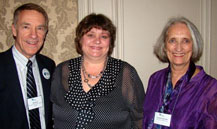 |
Elzmarie Oosthuizen (middle) with Prof. John Brock of Colorado University in Colorado Springs and Prof. Claudia Parliament of Minnesota University.
12 October 2012 |
An exceptional honour has been bestowed on Elzmarie Oosthuizen of the Faculty of Natural and Agricultural Sciences with the awarding of the Patricia K. Elder International Award to her in America at the beginning of October 2012.
The award is made by the National Association of Economics Educators and the Council for Economics Education (CEE). It gives recognition to individuals whose outstanding and committed service makes a meaningful impact on the delivery of economics education worldwide. The award was made to her at the 51th annual Financial Literacy and Economics Education Conference in Kansas City, Missouri.
Elzmarie is Manager: Teaching and Learning in the Faculty. She was originally appointed to manage various projects to better prepare students for what is expected of them. She teaches in the extended programme and achieved success with bridging mathematics and the changing methodologies that she uses.
She plays an active role in international economics education programming. Elzmarie was an essential element in the development of CEE’s programmes in South Africa and has now moved to expand economics education programmes to Namibia, Lesotho and Botswana.
She successfully participated in the CEE’s Train the Writers programme and lobbied the CEE to provide a mentoring programme that would prepare participants to offer a training of writers programme within their own country. This year, she presented the first writers programme for South African teachers.
Claudia Parliament, Director of the Minnesota Council on Economics Education, said in her recommendation for the award: “Elzmarie is a change agent. She has boundless energy. Few can keep up with her work pace. She has put economics education on the map in South Africa and she is poised to have a similar impact in other countries in southern Africa.”
Elzmarie says: “I feel very honoured to have received this award.” Since 2004, she has worked very hard and trained some 800 teachers. In 2011, some 200 000 children were reached through the training.